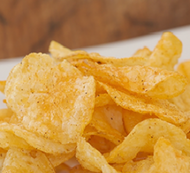Breaking News: Salty Snacks Cause Hunger, Not Thirst
Posted by May. 17, 2017 | BY Emma Alois on May 19th 2017

Have you ever finished a large bag of chips, even when you weren’t that hungry? Blame science. Instead of making you thirsty, salty foods are making you hungry.
What that also means is that, contrary to popular belief, the free bar nuts you offer guests are not making them thirstier and bringing in more drink orders. Those salty freebies are leading guests to order from your food menu instead! Consider those implications as you prepare for your next happy hour.
Restaurants and bars can thank space exploration for exposing the truth about salty snacks: An international team of scientists was the first to study how salt intake affects the body. The conventional wisdom was that salt causes thirst, leading one to drink more. As it turns out, that’s an old—and incorrect—assumption.
Scientist Reveals that Salt Intake Initiates Hunger, Not Thirst
With the purpose of studying nutrition and water consumption for space travel, scientists recently simulated a trip to Mars with 10 male volunteers. The conditions gave the researchers a unique opportunity to control every drop of liquid and morsel of food consumed by volunteers. All ingestion-related behaviors were monitored, including how much water was required and the number of bathroom visits the men had to make.
For the simulation, the volunteers were split into two groups, sealed in mock spaceships (one for 105 days and the other for 205) and given identical diets—except for the levels of salt. After the simulation, notes were compared and surprising conclusions made: Members of the group with a higher salt intake complained of hunger pains and were drinking less water than the other group, defying the age-old assumption that salty foods make you thirsty.
The scientists revealed why in the Journal of Clinical Investigation: Salt kickstarts a mechanism in the kidneys called the urea cycle, which keeps water in the body while urinating. When salt is ingested and passed through the urinary tract for disposal, the urea retains the water in the body and sends H2O back into the kidneys and body.
"Its function is to keep water in when our bodies get rid of salt,” said Professor Friedrich C. Luft, MD, one of the study’s coauthors. “Nature has apparently found a way to conserve water that should otherwise be carried away into the urine by salt.”Take Advantage of These Salty Revelations
Bar nuts are not the sneaky drink influencers we all thought them to be, but that doesn’t mean you shouldn’t still offer them. In fact, these findings come at the perfect time!
Just think about how much dining behavior is changing. Snacks are replacing full meals, and happy hours are less about cheap well drinks and more about a well-rounded drinking and dining experience. Not to mention, consumers are choosing restaurants over cooking at home so they can avoid clean-ups. All in all, diners are eating in smaller quantities and at slower paces.
So why not use salty snacks to “encourage” diners to enjoy your food offerings? Doing so could prove especially helpful for happy hours that feature food menus. Salty snacks are an easy way to boost your food promotions and get people ordering. If you offer some free salty nosh to guests, not only might they order another round of drinks to satiate their immediate thirst, but they may place a food order to satisfy their new hunger.
To elevate the concept of bar nuts, try a salty amuse bouche—something that highlights the skillfulness of your kitchen. After all, salty snacks are yet another opportunity to showcase your restaurant’s creativity and personality.
We all know the four main tastes: salty, sweet, bitter, and sour. Do you know what the fifth taste is?

